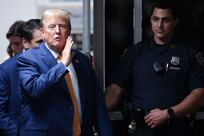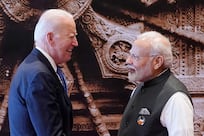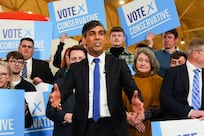The cameras are gone, the decorations have been pulled down and Panmunjom is back to being what it was for 65 years: a barren village at the centre of the heavily fortified Demilitarised Zone, the buffer that separates North Korea from South Korea. The heady euphoria generated by Friday's historic summit between the leaders of the two nations is rapidly dissolving as hard questions about genuine long-term prospects for peace between Pyongyang and Seoul inevitably emerge.
Warm handshakes between North Korean leader Kim Jong-un and his South Korean counterpart Moon Jae-in, though momentous, cannot in themselves end the hostilities between the two countries or denuclearise the Korean peninsula. Part of the difficulty is that this is a three-way conflict. As Mr Moon has said in the past, peace agreements between Pyongyang and Seoul will have to "have American endorsement" to work. And although both Washington and South Korea want the same result – a nuclear-free Korean peninsula – there is significant divergence in the strategies of US president Donald Trump and Mr Moon. The latter prefers an incremental "action for action" approach that would reward North Korea for every step it takes towards denuclearisation. The former insists that North Korea must fully dismantle its nuclear weapons programme before it is granted any sanctions relief. For its part, North Korea has made promises in the past without following up with any verifiable action to date.
The history between North Korea and South Korea is steeped in such bitterness and mutual distrust that caution is advisable when predicting the likelihood of peace on the basis of Friday's summit. A glimpse of how quickly things can fall apart was provided by an article published on Friday in Rodong Sinmun, the official newspaper of North Korea's Workers' Party, denouncing the leaders and members of South Korea's conservative opposition Liberty Party as "ugly traitors" for not being adequately deferential to Mr Kim. It is a reminder not only that North Korea's totalitarian regime can be exceedingly sensitive to anything that appears even remotely critical of its leadership but also that the peace process is subject to the democratic politics of South Korea, whose opposition has already attacked Friday's summit as a "show camouflaged as peace". To top it all, there is the question of Mr Kim. How to measure the pledges of a man at the head of the most totalitarian government on earth? We should not get carried away by Friday's summit. The task before all those invested in a nuclear-free Korean peninsula remains a mammoth one.





